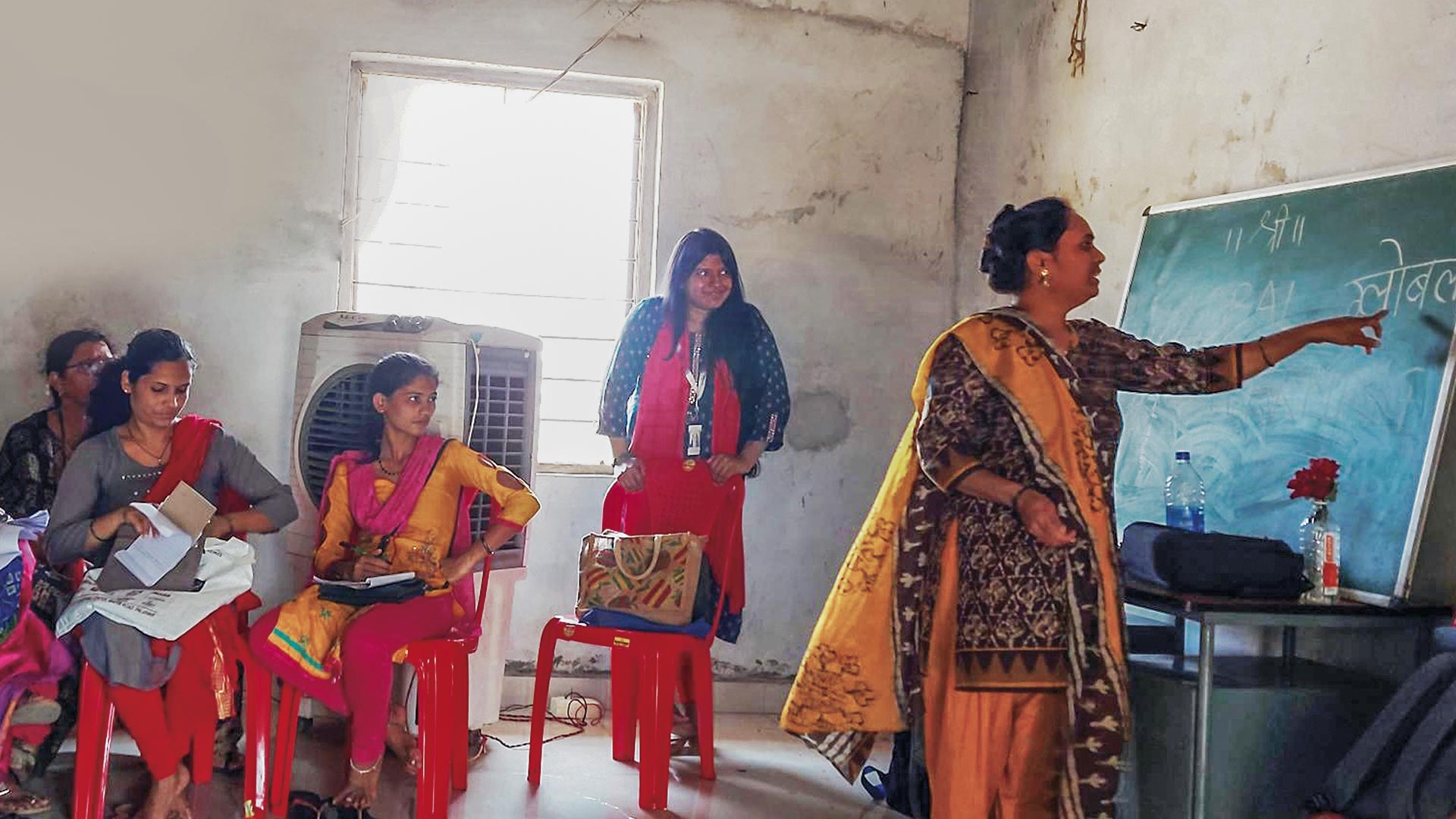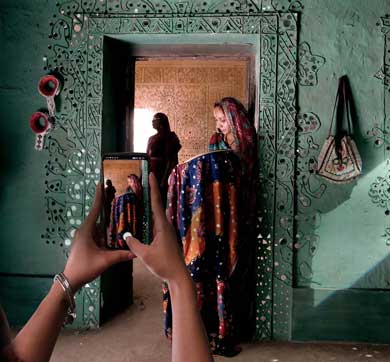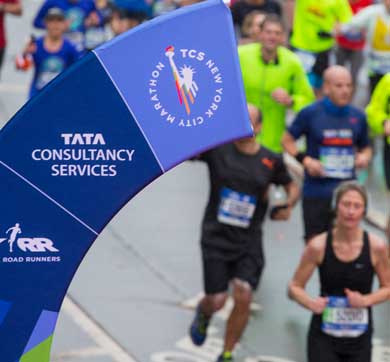March 2025 | 1679 words | 6-minute read
Using the theory of cognition and laws of perception, Tata Consultancy Services’ (TCS) Literacy as a Service (LaaS) programme leverages algorithmic learning paths, cloud-based personalised vernacular content and artificial intelligence (AI) technology to impart functional, digital and financial literacy to empower non-literates. The programme is provided in native languages and aims to tackle one of India’s most persistent social challenges.
“India is home to the largest population of 15+ -year-old non-literates in the world and accounts for nearly 40% of illiterate adults globally,” says Balaji Ganapathy, till recently the Chief Social Responsibility Officer, TCS. “Of these, about 65% are women, intensifying their struggles further. India’s aspiration to become a $5 trillion economy by 2025 and a $7 trillion economy by 2030 can only happen if we bridge this inequality and take all our citizens along.”
With this thought in mind, TCS launched LaaS, its adult literacy programme to empower people in their native languages, in 2000. LaaS is an evolution of TCS’ Adult Literacy Program (ALP), a Computer-Based Functional Literacy (CBFL) initiative. “The idea behind ALP came from Dr Kohli, our founder,” says Mr Ganapathy. “He had the vision to start a programme that would help adults become literate and participate more fully in society.”
Transformative techniques
LaaS incorporates innovative learning methodologies and insights in behavioural science to reduce the cognitive load on the learner and trainer, making learning fun in the process. “How we teach adults differs from how we teach children,” Mr Ganapathy explains. “Adults already know words and have a vocabulary; what they don’t know is the correlation between the written word and the one they hear.”
To bridge the gap, LaaS helps learners to read, write and understand a word bank of 500 frequently used words in their target language. Trainers from TCS’ partner NGOs use a mix of puppet theatre, role play, teaching software, multimedia presentations and printed material to teach the learners in peer group learning sessions. Volunteer trainers or Preraks are equipped with laptops and are trained to teach learners by relating the course curriculum to scenarios around them. The role-play scenarios change as per the cultural context of the learner. It takes three to four months for a group of about 25 people to go through a module. The learnings from each batch are used to improve the experience for future batches.
Empowering communities
Using a combination of graphics, sound patterns and language structure, LaaS has transformed the lives of over 24 lakh people by helping them become functionally literate in a fraction of the cost and time used by traditional methods. TCS’ literacy offering started with the core idea that participants should learn the three Rs: reading simple text, writing their names, words and sentences and basic arithmetic calculations. It has gone on to add new offerings, including financial literacy, digital literacy, awareness on key citizen entitlements and disaster risk reduction literacy.
The programme started in Hyderabad and is now available across 21 Indian states and union territories, and Africa. It is available in nine Indian languages — Bengali, Gujarati, Hindi, Kannada, Marathi, Odia, Tamil, Telugu and Urdu — and three foreign languages — Arabic, Sotho and Mooré. To expand its reach, TCS has partnered with NGOs in India and abroad, state literacy departments and rural livelihood missions, often using government machinery. “The programme needs to create an impact at the grassroots level,” says Mr Ganapathy. “There are last-mile hurdles that we need to overcome to ensure that the programme reaches those who need it the most.”
Learning to stand tall
The lack of literacy, including financial and digital literacy, prevents people from getting high-paying jobs or managing their assets efficiently. They are also unable to maintain a credit history, avail of loans or make digital transactions. A valuable social by-product of literacy is the ability to protect yourself from being cheated. As in the case of Tara Devi and her family, residents of Bhaipur Khurd village in Uttar Pradesh, who worked at a brick kiln for nearly 16 hours each day, receiving a pittance for their labour. Unable to calculate their wages, they were often exploited by middlemen. When LaaS started in Bhaipur Khurd, TCS’ NGO partner in the district brought Tara Devi to the literacy centre. With the help of daily lessons, she learnt to read in Hindi and do simple arithmetic. Today, she runs a small general goods store and personally maintains her own accounts, even managing to send her children to school.
In Kumthi village in Madhya Pradesh, 52-year-old Parvatibai, a farm labourer and a student in LaaS’ Nai Disha project, is embracing the change that comes with knowing how to read and write. “We receive daily wages… We have to stand in a queue and wait for the employers to fetch the stamp pad to put the thumb impression on the declaration sheet before they hand us the money, while the ones who can sign their names get their wages in a matter of minutes,” she says. “The look on their face on the first day I signed my name after learning to write through the LaaS classes will never be forgotten by me,” says a beaming Parvatibai.
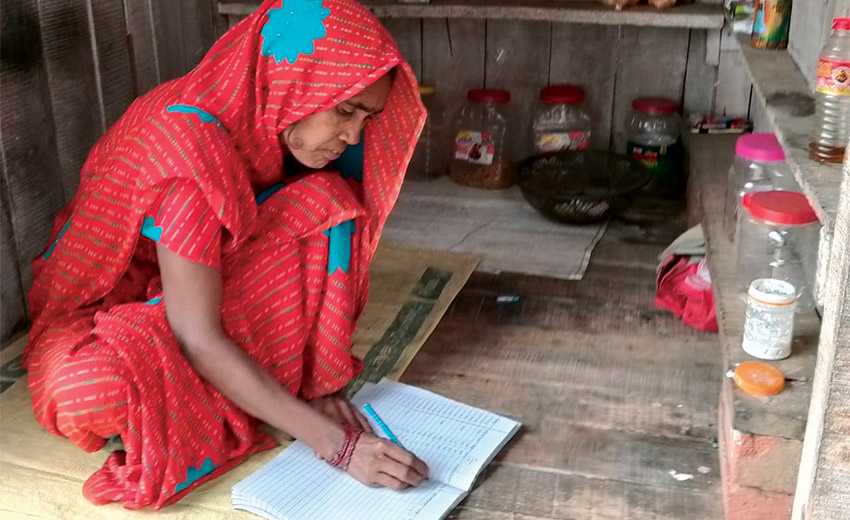
New avatar
“The outcomes that we are aiming for have shifted over the years,” says Mr Ganapathy. “Earlier, our goal was reading, writing and arithmetic. Today, it also includes financial literacy — helping people build financial assets, use financial services, do financial transactions, financial management — and using digital services, digital assets, digital management and accessing basic citizen entitlements.”
Besides protecting people’s interests, LaaS’ upgraded version has another goal. “It is a pathway to livelihood,” says Mr Ganapathy. “The quality-of-life parameters also start to show an upward trajectory because of the intentionality of connecting to livelihoods and future opportunities.”
The results are encouraging. An assessment of LaaS’ impact in the target states of Haryana, Rajasthan, Madhya Pradesh and Uttar Pradesh revealed that the initiative had led to a 70% increase in self-confidence and self-esteem. The evaluation also reported a 68% increase in mobility to markets and banks and in the use of mobile phones, a 41% increase in financial and economic activities and a 68% increase in leadership qualities and decision-making. There was also a 58% increase in their socio-cultural status and community participation.
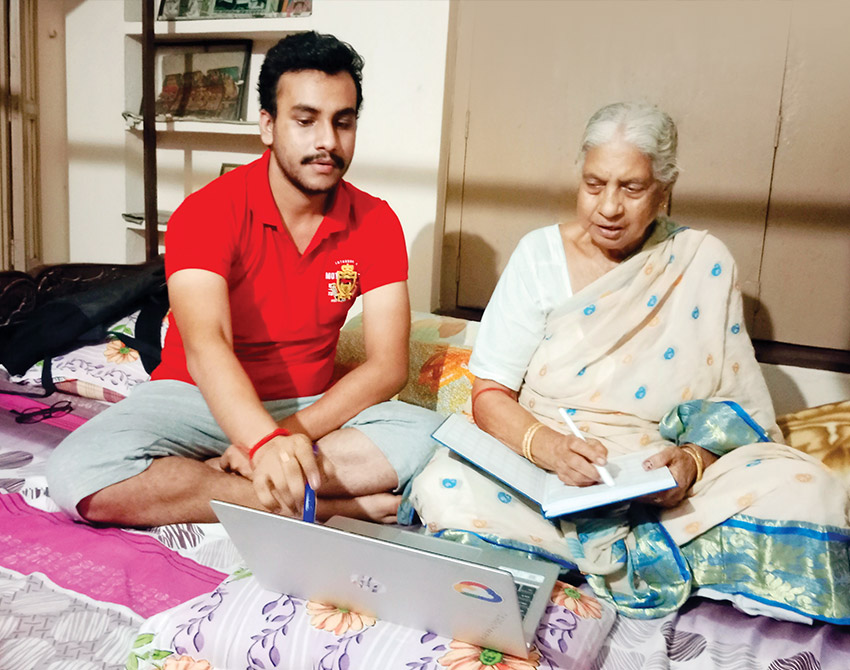
Shared goals
“We believe that if we can enable 10 crore people to be literate by 2030, it will generate enough momentum to encourage other organisations to adopt it as a national mission,” says Mr Ganapathy. Towards this goal, TCS started collaborating with state governments and other institutions three years ago, offering their expertise and technical assistance to replicate the programme where needed.
The State Literacy Mission Authority of Madhya Pradesh implemented the programme in 2022-23, transforming 11 lakh lives. In March 2023, a large number of these students appeared for the National Institute of Open Schooling examinations, marking the largest number of formerly illiterate people passing the test in a single year. This phenomenal success assured TCS of the viability and robustness of its offering.
The Rotary Club of Mumbai has also incorporated LaaS into its own literacy programme being run in the slums of Dharavi and in Palghar near Mumbai, impacting the lives of 10,500 women through a single partnership. Over the last eight months, TCS has been building on Tata Steel Foundation’s (TSF) Masti ki Pathshala programme by improving the literacy of the school children’s parents. The programme has yielded remarkable results. Not only is the children’s confidence increasing, their perception of their parents and their capabilities is changing too. Children feel happy about their parents’ growth, a greater sense of pride and a stronger bond with them, bringing about behavioural changes in the family.
As part of its collaboration with the Tata Sustainability Group (TSG), LaaS has empowered 12,000 women in Cyclone Fani-impacted Puri district in Odisha.
Unlocking new futures
In 2021, working with Jammu University, TCS introduced LaaS at Bhaderwah Jail, in Jammu, and has helped 185 prisoners so far. The programme assists in the 3Rs — Reformation, Rehabilitation and Reintegration — of the penal system, playing an important role in equipping inmates to lead a normal life on release. At the prison, TCS used the train-the-trainer approach to create a ripple effect of moral and educational development. Inmates who had studied at least up to Std 10, and displayed leadership qualities, were trained to become Preraks and run the LaaS centre, teaching fellow inmates. The centre has had a successful run — a 100% literacy rate for all batches.
Volunteering spirit
While LaaS has enjoyed success from the beginning, the sheer scale of the issue demanded a more democratised approach, leading to the creation of Each One Empowers One — TCS’ volunteer-led intuitive digital literacy platform. Its association with TSG and volunteers from TCS, Tata Power, Tata AutoComp Systems, Tata Metaliks, TSF and other Tata companies is a key part of the programme.
“The volunteer model is built using the principles of design thinking and journey mapping,” says Mr Ganapathy. “TCS volunteers are enablers, playing the role of the Prerak/facilitator.” The platform enables anyone in the Tata ecosystem to become a TCS literacy champion and empower those around them with financial and digital literacy. It currently has 4,700+ volunteers and is accessible in nine Indian languages and offers an engaging experience with training, videos, assessments and digital certificates for volunteers and beneficiaries.
TCS is continuing to innovate the programme design and expand partnerships to meet its goal of transforming 10 crore lives by 2030. The scale of the challenge might seem massive, but so is the strength of TCS’ determination to achieve its goals.
—Cynthia Rodrigues




